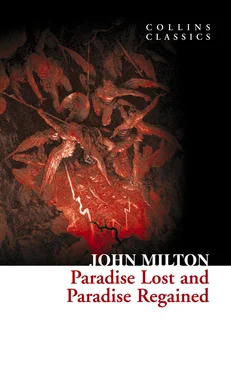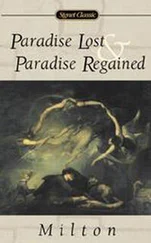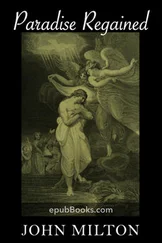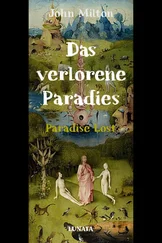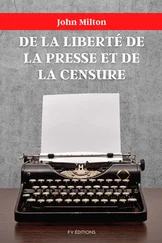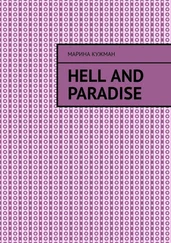Will he, so wise, let loose at once his ire,
Belike through impotence or unaware,
To give his enemies their wish, and end
Them in his anger whom his anger saves
To punish endless? ‘Wherefore cease we, then?’
Say they who counsel war; ‘we are decreed,
Reserved, and destined to eternal woe;
Whatever doing, what can we suffer more,
What can we suffer worse?’ Is this, then, worst—
Thus sitting, thus consulting, thus in arms?
What when we fled amain, pursued and struck
With Heaven’s afflicting thunder, and besought
The Deep to shelter us? This Hell then seemed
A refuge from those wounds. Or when we lay
Chained on the burning lake? That sure was worse.
What if the breath that kindled those grim fires,
Awaked, should blow them into sevenfold rage,
And plunge us in the flames; or from above
Should intermitted vengeance arm again
His red right hand to plague us? What if all
Her stores were opened, and this firmament
Of Hell should spout her cataracts of fire,
Impendent horrors, threatening hideous fall
One day upon our heads; while we perhaps,
Designing or exhorting glorious war,
Caught in a fiery tempest, shall be hurled,
Each on his rock transfixed, the sport and prey
Or racking whirlwinds, or for ever sunk
Under yon boiling ocean, wrapt in chains,
There to converse with everlasting groans,
Unrespited, unpitied, unreprieved,
Ages of hopeless end? This would be worse.
War, therefore, open or concealed, alike
My voice dissuades; for what can force or guile
With him, or who deceive his mind, whose eye
Views all things at one view? He from Heaven’s height
All these our motions vain sees and derides,
Not more almighty to resist our might
Than wise to frustrate all our plots and wiles.
Shall we, then, live thus vile—the race of Heaven
Thus trampled, thus expelled, to suffer here
Chains and these torments? Better these than worse,
By my advice; since fate inevitable
Subdues us, and omnipotent decree,
The Victor’s will. To suffer, as to do,
Our strength is equal; nor the law unjust
That so ordains. This was at first resolved,
If we were wise, against so great a foe
Contending, and so doubtful what might fall.
I laugh when those who at the spear are bold
And venturous, if that fail them, shrink, and fear
What yet they know must follow—to endure
Exile, or igominy, or bonds, or pain,
The sentence of their Conqueror. This is now
Our doom; which if we can sustain and bear,
Our Supreme Foe in time may much remit
His anger, and perhaps, thus far removed,
Not mind us not offending, satisfied
With what is punished; whence these raging fires
Will slacken, if his breath stir not their flames.
Our purer essence then will overcome
Their noxious vapour; or, inured, not feel;
Or, changed at length, and to the place conformed
In temper and in nature, will receive
Familiar the fierce heat; and, void of pain,
This horror will grow mild, this darkness light;
Besides what hope the never-ending flight
Of future days may bring, what chance, what change
Worth waiting—since our present lot appears
For happy though but ill, for ill not worst,
If we procure not to ourselves more woe.”
Thus Belial, with words clothed in reason’s garb,
Counselled ignoble ease and peaceful sloth,
Not peace; and after him thus Mammon spake:—
“Either to disenthrone the King of Heaven
We war, if war be best, or to regain
Our own right lost. Him to unthrone we then
May hope, when everlasting Fate shall yield
To fickle Chance, and Chaos judge the strife.
The former, vain to hope, argues as vain
The latter; for what place can be for us
Within Heaven’s bound, unless Heaven’s Lord supreme
We overpower? Suppose he should relent
And publish grace to all, on promise made
Of new subjection; with what eyes could we
Stand in his presence humble, and receive
Strict laws imposed, to celebrate his throne
With warbled hymns, and to his Godhead sing
Forced hallelujahs, while he lordly sits
Our envied sovereign, and his altar breathes
Ambrosial odours and ambrosial flowers,
Our servile offerings? This must be our task
In Heaven, this our delight. How wearisome
Eternity so spent in worship paid
To whom we hate! Let us not then pursue,
By force impossible, by leave obtained
Unacceptable, though in Heaven, our state
Of splendid vassalage; but rather seek
Our own good from ourselves, and from our own
Live to ourselves, though in this vast recess,
Free and to none accountable, preferring
Hard liberty before the easy yoke
Of servile pomp. Our greatness will appear
Then most conspicuous when great things of small,
Useful of hurtful, prosperous of adverse,
We can create, and in what place soe’er
Thrive under evil, and work ease out of pain
Through labour and endurance. This deep world
Of darkness do we dread? How oft amidst
Thick clouds and dark doth Heaven’s all-ruling Sire
Choose to reside, his glory unobscured,
And with the majesty of darkness round
Covers his throne, from whence deep thunders roar.
Mustering their rage, and Heaven resembles Hell!
As he our darkness, cannot we his light
Imitate when we please? This desert soil
Wants not her hidden lustre, gems and gold;
Nor want we skill or art from whence to raise
Magnificence; and what can Heaven show more?
Our torments also may, in length of time,
Become our elements, these piercing fires
As soft as now severe, our temper changed
Into their temper; which must needs remove
The sensible of pain. All things invite
To peaceful counsels, and the settled state
Of order, how in safety best we may
Compose our present evils, with regard
Of what we are and where, dismissing quite
All thoughts of war. Ye have what I advise.”
He scarce had finished, when such murmur filled
Th’ assembly as when hollow rocks retain
The sound of blustering winds, which all night long
Had roused the sea, now with hoarse cadence lull
Seafaring men o’erwatched, whose bark by chance
Or pinnace, anchors in a craggy bay
After the tempest. Such applause was heard
As Mammon ended, and his sentence pleased,
Advising peace: for such another field
They dreaded worse than Hell; so much the fear
Of thunder and the sword of Michael
Wrought still within them; and no less desire
To found this nether empire, which might rise,
By policy and long process of time,
In emulation opposite to Heaven.
Which when Beelzebub perceived—than whom,
Satan except, none higher sat—with grave
Aspect he rose, and in his rising seemed
A pillar of state. Deep on his front engraven
Deliberation sat, and public care;
And princely counsel in his face yet shone,
Majestic, though in ruin. Sage he stood
With Atlantean shoulders, fit to bear
The weight of mightiest monarchies; his look
Drew audience and attention still as night
Or summer’s noontide air, while thus he spake:—
“Thrones and Imperial Powers, Offspring of Heaven,
Ethereal Virtues! or these titles now
Must we renounce, and, changing style, be called
Princes of Hell? for so the popular vote
Inclines—here to continue, and build up here
A growing empire; doubtless! while we dream,
And know not that the King of Heaven hath doomed
Читать дальше
